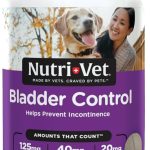As our furry friends age, it’s not uncommon to notice subtle changes in their behavior and physiology. One of the most common concerns for dog owners is bladder control – a crucial aspect of a dog’s overall health. In this blog post, we’ll delve into the world of bladder control for older dogs, exploring the reasons behind this issue, and providing actionable tips to help your senior pup stay dry and comfortable.
Why Bladder Control Matters
Aging can affect a dog’s ability to hold their urine, leading to accidents in the house or frequent trips outside. This not only creates stress for the owner but also increases the risk of urinary tract infections (UTIs) and skin irritations. Moreover, bladder control issues can be a sign of underlying health problems, such as kidney disease or cognitive decline.
Key Insight: Age-Related Changes in Bladder Function
One of the primary reasons older dogs experience bladder control issues is due to age-related changes in bladder function. As dogs age, their bladders naturally lose elasticity and muscle tone, making it harder for them to hold their urine. Additionally, the frequency and amount of urine production can increase with age, putting extra pressure on an already compromised bladder.
As we discussed earlier, aging can significantly impact a dog’s ability to control their bladder. In this section, we’ll explore some key points that can help you better understand why bladder control matters for older dogs.
The Impact of Age-Related Changes
In addition to the natural loss of elasticity and muscle tone in the bladder, other age-related changes can also contribute to bladder control issues. For example, as dogs age, their nervous system’s ability to regulate bowel movements and urinary function can decline. This can lead to an increase in frequency and urgency to urinate.
The Role of Hormones
Hormonal changes that occur with aging can also affect a dog’s bladder control. For instance, the decrease in estrogen levels in female dogs can lead to changes in bladder function, making it more challenging for them to hold their urine. Similarly, testosterone levels decline in male dogs as they age, which can also impact urinary function.
Common Signs of Bladder Control Issues
If your older dog is experiencing bladder control issues, you may notice some common signs, including:
- Frequent accidents in the house or yard
- Increased thirst and urination
- Painful urination
- Straining to urinate
- Changes in bowel movements
What You Can Do to Help Your Senior Dog
The good news is that there are many things you can do to help your older dog maintain bladder control. By following a few simple tips and making some lifestyle changes, you can help reduce the frequency of accidents and keep your senior pup comfortable.
For more information on how to manage bladder control issues in older dogs, check out this article from the American Kennel Club.
In our next section, we’ll explore some actionable tips and strategies for helping your older dog maintain bladder control. Stay tuned!
Get Expert Guidance on Bladder Control for Older Dogs
Consult with our expert dog care team to learn how to effectively manage your older dog’s bladder control issues.
Start chatIn our previous discussion, we explored the importance of bladder control for older dogs, highlighting the reasons behind this issue and providing actionable tips to help your senior pup stay dry and comfortable.
Summary of Key Points
To recap, we’ve covered:
- The significance of bladder control for older dogs, including the increased risk of accidents in the house, UTIs, and skin irritations.
- The age-related changes in bladder function that contribute to bladder control issues, such as loss of elasticity and muscle tone, increased urine production, and compromised bladder health.
Final Insights
In addition to the tips we’ve shared earlier, it’s essential for dog owners to monitor their senior pup’s bladder control closely. Keep a lookout for changes in your dog’s behavior or frequency of accidents, as these can be indicative of an underlying health issue.
Avoiding excessive water intake and providing regular exercise can also help improve your dog’s overall bladder function. Consult with your veterinarian if you notice any significant changes or concerns regarding your older dog’s bladder control.
Conclusion
In conclusion, bladder control is a vital aspect of an older dog’s health, and addressing this issue early on can make all the difference in ensuring your senior pup stays comfortable and happy. By recognizing the signs of age-related changes, taking proactive steps to support their bladder function, and working closely with your veterinarian, you’ll be well-equipped to help your older dog thrive despite any challenges they may face.
Expertly handling 5e crossbows: A hand crossbow experience: Are you ready to unleash your inner archer? This hands-on guide takes you on a journey of mastering the art of 5e crossbow combat. Click to learn expert tips and tricks!
Get your free psychic reading: Ask one question online today: Curious about the mysteries of the universe? Unlock the secrets of your past, present, and future with a FREE psychic reading. Simply ask one question and discover the insights waiting for you!


